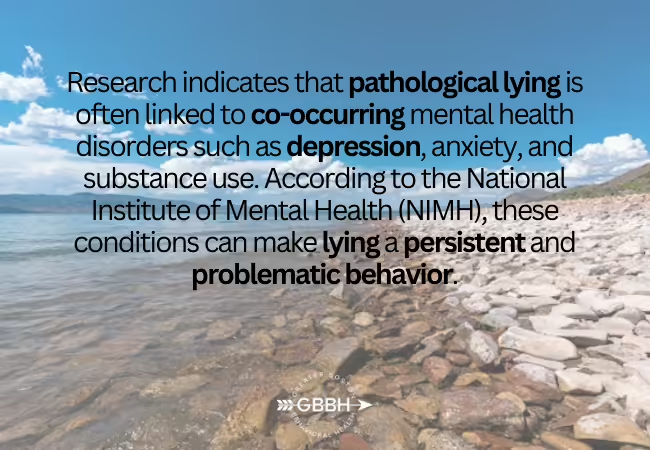Pathological lying is more than just occasional fibs; it is a chronic, compulsive behavior that can severely affect personal relationships, well-being, and trust. Unlike the occasional white lie most people tell, pathological lying becomes an automatic and persistent behavior that can escalate over time. Recognizing the signs of a pathological liar and understanding the effects this behavior has on one’s mental health and those around them is crucial for finding the right support and treatment.
In this blog, we will explore the signs of a pathological liar, discuss potential causes, and explain how mental health treatment programs can support individuals struggling with this condition.
Psychological Underpinnings of Pathological Lying
Pathological lying is often linked to deeper psychological and emotional issues. It can be a symptom of certain personality disorders, such as narcissistic personality disorder or antisocial personality disorder. These disorders often involve a pattern of behaviors where individuals struggle to empathize with others and prioritize their own desires or self-image above all else. In some cases, pathological lying may be a defense mechanism to protect the individual from perceived threats or to maintain a desired identity or status.
Additionally, chronic stress, childhood trauma, or abuse can contribute to the development of compulsive lying. These experiences can create a pattern of thinking where lies become a coping strategy for managing fear, insecurity, or feelings of inadequacy. Understanding the psychological roots of pathological lying can lead to better insight into the individual’s behavior and more effective treatment strategies.
Recognizing Pathological Lying in Different Settings
Pathological lying can manifest in a variety of environments, and recognizing it can be critical for addressing the issue. In personal relationships, signs may include frequent stories that seem exaggerated or inconsistent, or a pattern of fabricating details to manipulate outcomes. In professional settings, a pathological liar might create false achievements or embellish work-related stories to gain favor or avoid blame.
Identifying pathological lying also requires observing the consistency and motivation behind the lies. Unlike occasional lying, which may serve to avoid minor conflict or embarrassment, pathological lying is habitual and often serves deeper, more ingrained needs such as a desire for attention, power, or control. Understanding these traits can be helpful for recognizing and responding to the behavior in different situations.
10 Signs You’re Dealing with a Pathological Liar
- Consistently Telling Untrue Stories: Pathological liars fabricate stories that are often elaborate and highly detailed. They might lie for seemingly no reason or fabricate entire events that never happened. Unlike typical lies that might be told to avoid conflict or gain favor, a pathological liar lies even when there is no benefit to doing so.
- Exaggeration and Over-the-Top Details: These individuals often use excessive detail to make their stories sound more convincing. The lie may be compelling on the surface but can fall apart when scrutinized. This is part of the pathological liar’s skill at manipulating perceptions.
- Lying Even When It’s Not Necessary: A key characteristic of pathological lying is that it occurs even when telling the truth would have no negative consequences. The lies may be out of habit or a subconscious compulsion, revealing how ingrained the behavior is.
- Frequent Shifting Stories: Pathological liars can have a difficult time maintaining consistency in their narratives. Their stories often shift, making them difficult to pin down. This behavior creates confusion and can erode trust, leading to strained relationships.
- Compulsive Lying: The behavior becomes a reflex for them, like a knee-jerk reaction. This makes it hard for them to control their impulse to lie, even when faced with potential negative outcomes. The compulsive nature of the behavior can contribute to significant emotional distress.
- Lack of Remorse or Guilt: Unlike someone who may feel guilt or remorse for telling a lie, a pathological liar typically shows little to no remorse. They may even become defensive, blaming others or minimizing the impact of their actions when confronted.
- Manipulative Behavior: Pathological liars use their stories as tools for manipulation. They may lie to gain sympathy, deceive others, or make themselves appear more favorable. This manipulation can damage relationships and make others question their own judgment.
- Emotionally Distanced Relationships: Trust is vital for healthy relationships, and a pathological liar’s inability to be truthful can lead to emotional detachment. The fear of being exposed or rejected may prevent them from opening up to others, further complicating their social connections.
- Psychological and Emotional Symptoms: Pathological lying is often linked with underlying psychological conditions such as personality disorders. These can include borderline personality disorder, narcissistic personality disorder, or antisocial personality disorder. Individuals who lie frequently may also struggle with depression, anxiety, and emotional dysregulation.
- Engaging in Self-Serving Lies: Pathological liars often tell lies to protect themselves, enhance their image, or achieve a personal goal. The lies are crafted to fulfill their desires without considering the impact on others.
Why Pathological Lying Occurs
Pathological lying can stem from a variety of psychological and environmental factors. It is often linked to:
- Personality Disorders: Certain personality disorders, such as borderline personality disorder or narcissistic personality disorder, may be associated with compulsive lying.
- Trauma and Abuse: Individuals who have experienced significant trauma or abuse may develop lying as a defense mechanism or coping strategy.
- Neurodevelopmental Factors: Brain development and neurotransmitter imbalances could play a role in the inability to regulate impulses or process emotions healthily.
- Learned Behavior: For some, lying is learned behavior from early childhood, possibly reinforced by a household or social environment where deceit was used for survival or manipulation.
Therapeutic Approaches for Addressing Pathological Lying
Effective treatment for pathological lying typically involves a combination of therapeutic approaches. Cognitive-behavioral therapy (CBT) is particularly useful, as it helps individuals identify and challenge the distorted thoughts and beliefs that fuel their behavior. CBT also assists in teaching healthier coping mechanisms and problem-solving strategies to replace the need for lies.
Dialectical behavior therapy (DBT), which is beneficial for those with difficulties in emotional regulation, can help individuals learn how to manage their impulses and develop more authentic interactions with others. This approach includes mindfulness practices and interpersonal effectiveness skills, both of which can assist in recognizing the urge to lie and responding in a more truthful way.
In addition, therapy may involve working with a mental health professional to explore the underlying reasons for lying, such as past trauma or low self-esteem. Treatment plans might also include group therapy for social learning, where individuals can interact with others facing similar challenges and share strategies for being more truthful.
Challenges and Myths About Treatment for Pathological Lying
One common myth is that individuals who engage in pathological lying are inherently deceitful or manipulative, making them resistant to treatment. While it is true that treatment can be challenging due to denial or a lack of insight, effective therapeutic approaches can lead to positive change. Another misconception is that therapy is only for those who are already aware of their behavior; in fact, therapy can be valuable even for individuals who don’t recognize the extent of their compulsions.
Treatment also faces challenges when individuals exhibit traits that are resistant to change, such as narcissism or antisocial behavior. In these cases, therapists often need to take a nuanced approach, prioritizing trust-building and gradually addressing denial before more in-depth therapeutic work can begin.
The Benefits of Early Intervention and Seeking Help
Early intervention is critical for addressing pathological lying before it becomes deeply ingrained in behavior. Seeking help early can prevent the development of more severe psychological issues and improve outcomes for individuals and their loved ones. People who receive therapy early often see greater improvements in self-awareness, relationship dynamics, and overall mental health.
Early intervention also enables a more tailored approach to treatment. Identifying and addressing the patterns of lying early can help prevent potential damage to relationships, careers, and social standing. When individuals work with professionals at a mental health treatment center, they can begin the process of developing healthier thought patterns and behaviors, making significant strides toward recovery and improved well-being.
How Mental Health Treatment Can Help
Managing pathological lying is possible with appropriate mental health treatment. Cognitive-behavioral therapy (CBT) is one of the most effective approaches for helping individuals recognize and change their behavior patterns. It teaches strategies for emotional regulation, reality testing, and truth-telling, empowering individuals to build healthier habits.
Dialectical behavior therapy (DBT) is also helpful, particularly for those who struggle with emotional dysregulation. DBT incorporates mindfulness, distress tolerance, and interpersonal effectiveness skills that can help people manage their emotional responses and decrease impulsive behaviors.
Treatment programs offered at a mental health treatment center in Massachusetts, like Greater Boston Behavioral Health, include a range of options:
- Intensive Outpatient Program (IOP): Designed for individuals who need structured support but do not require 24/7 supervision. This program offers intensive therapy sessions that focus on emotional regulation and cognitive restructuring.
- Partial Hospitalization Program (PHP): For those who need more intensive treatment but can return home each evening. PHP provides comprehensive support and a structured environment that aids in building coping mechanisms.
When to Seek Professional Help
If you or someone you know exhibits consistent signs of pathological lying that disrupt relationships, impact daily functioning, or contribute to emotional or psychological distress, seeking professional help is crucial. Early intervention can help individuals gain control over compulsive behaviors and improve their quality of life.
Greater Boston Behavioral Health is committed to supporting individuals who are dealing with complex mental health challenges. Our experienced therapists offer evidence-based treatment programs that address the unique needs of each client. We understand the impact that compulsive lying can have on individuals and their loved ones, and we are here to help navigate the path toward healing and recovery.
Conclusion
Pathological lying is a challenging and often misunderstood behavior. By recognizing the signs, understanding the causes, and seeking the right support, individuals can begin to address these patterns and work towards healthier, more truthful relationships. If you or a loved one is struggling with this issue, reach out to Greater Boston Behavioral Health to learn more about how our specialized treatment programs can help. Call us at (888)278-0716 today to learn more about our services and how we can help you on your journey to recovery!
FAQs on Pathological Lying
What causes someone to become a pathological liar?
Pathological lying can be influenced by various factors such as childhood trauma, personality disorders (e.g., narcissistic or antisocial personality disorder), stress, or low self-esteem. It may also act as a coping mechanism for underlying emotional issues.
How is pathological lying treated?
Treatment for pathological lying typically involves therapeutic approaches like Cognitive-behavioral therapy (CBT), Dialectical behavior therapy (DBT), and group therapy. These therapies help individuals identify and challenge distorted thoughts, manage emotions, and develop healthier coping strategies.
Can therapy really help someone who lies habitually?
Yes, therapy can help individuals learn to manage the urge to lie and develop healthier, truthful behaviors. Early intervention is key to successful treatment.
When should someone seek help for pathological lying?
If someone’s lying is causing significant problems in their personal, professional, or social life, or if they recognize an inability to stop lying, they should seek help from a mental health professional or a mental health treatment center.


